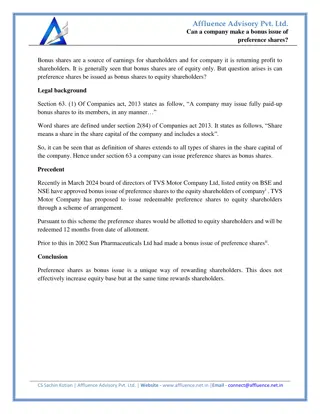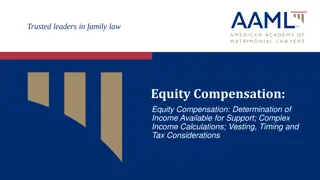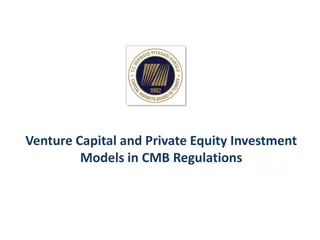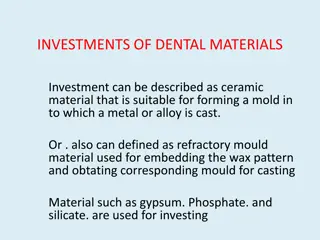Types of Shares: Ordinary and Preference Shares in Equity Investments
Equity capital in a company is comprised of ordinary and preference shares. Ordinary shares represent full risk and reward for shareholders, who can vote on resolutions and receive dividends. Preference shares offer specific features like cumulative or participating dividends, non-voting rights, and priority in dividend payments and company liquidation. Understanding these types of shares is essential for investors in the financial markets.
Download Presentation

Please find below an Image/Link to download the presentation.
The content on the website is provided AS IS for your information and personal use only. It may not be sold, licensed, or shared on other websites without obtaining consent from the author. Download presentation by click this link. If you encounter any issues during the download, it is possible that the publisher has removed the file from their server.
E N D
Presentation Transcript
CISI Financial Products, Markets & Services Topic Equities (4.1.2) Ordinary and Preference Shares cisi.org
Types of shares How is the capital of a company made up? Capital of a company Money invested by the owners Borrowing Shares, Stock or Equity Long-term bank loans Bonds SHARES = EQUITY CAPITAL There are 2 main types of shares: 1. ORDINARY SHARES 2. PREFERENCE SHARES cisi.org
Ordinary Shares Shares, Stock or Equity Company share capital ALWAYSincludes ordinary shares ENTITLEMENTS FEATURES Full risk and reward of investing (Shareholders do well if the company does and vice-versa) Ordinary Shares Can be fully paid The shareholder has paid all of the initial capital reflecting the full value of the shares owned. Entitled to a yes or no vote to each resolution at company meetings Can be partly paid - The shareholder has not paid the entire initial capital. The shareholder has an obligation to pay the remaining amount when the company calls upon them to do so. This is also known as contributing shares. Receive dividends declared by the company Half-yearly or quarterly They ratify the dividend amount proposed by the directors before they are declared payable but dividends are not always paid or as large as liked Owners of ordinary shares They technically own the company cisi.org
TYPES OF PREFERENCE SHARE CUMULATIVE Dividend entitlements accumulate if they are not paid one year NON-CUMULATIVE If a company does not pay out dividends one year, these shareholders miss out on this dividend PARTICIPATING Entitle the holder to a basic dividend but the directors can award a bigger dividend in a year when the profits exceed a certain level. i.e. preference shareholder can participate in bumper profits. Preference Shares Shares, Stock or Equity FEATURES/ENTITLEMENTS Articles of Association sets out precisely how they differ from ordinary shares. SOME companies have preference shares as well as ordinary shares Hybrid Securities they have characteristics of bonds and equities. Non-voting - cannot vote at the General Meetings of the company Preference Shares Pay a fixed dividend each year, the amount set when first issued and has to be paid before dividends on ordinary shares can be paid CONVERTIBLE Carry an option to convert into the ordinary shares of the company at set intervals and on pre-set terms. REDEEMABLE Have a date at which the nominal value may be redeemed - paid back to the preference shareholder and the shares cancelled. Preference shares have legal priority (seniority) over ordinary shareholders in respect of their dividends and collapse of the company (will get their money back before ordinary shareholders) NO VOTING ENTITLEMENTS RECIEVE FIXED DIVIDENDS PAID BACK BEFORE ORDINARY SHAREHOLDERS IF COMPANY IS WOUND UP cisi.org























